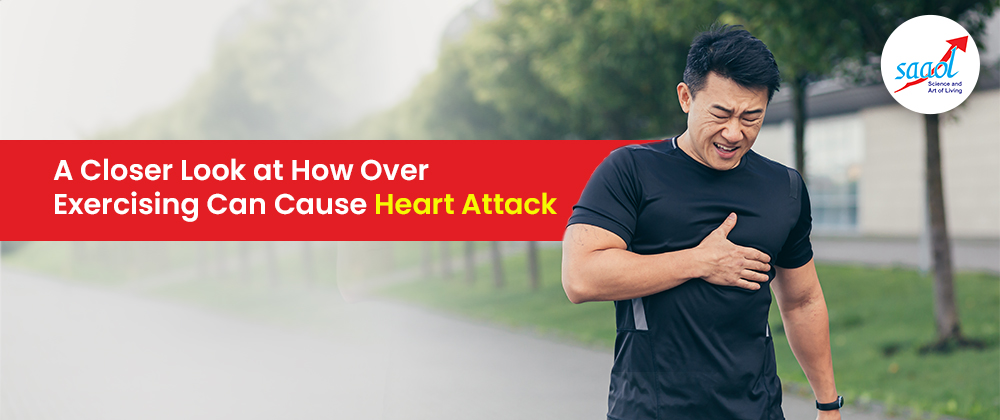A Closer Look at How Over Exercising Can Cause Heart Attack
SAAOL
- November 25, 2023
- 5 Min Read

Exercise is one of the best way one can maintain their health but so is over exercising. In the pursuit of a healthier lifestyle, most of us turn to exercise as a main component in our routine. But one needs to also remember to take caution, it is important to understand that, just like medicine, exercise can be a potent force when not practiced in moderation. In this blog, we will try to uncover the intricacies of exercise and its potential impact on heart health from the perspective of moderation.
Balancing Act of Medicine and Poison
The saying is true “every medicine is a poison if given at the wrong time and wrong dose” and it can be applied for exercise as well. There are multiple health benefits of exercising but it is also important to understand that pushing your limits without getting your health properly evaluated can also be a serious risk and can even have fatal outcomes. Dr. Bimal Chhajer has in several webinars on heart health highlights the importance of understanding one’s health status before engaging in intensive exercise.
Who Should Exercise with Caution?
People who have the following conditions should practice caution and get themselves evaluated before starting high intensity interval training (HIIT) or intensive exercise routines.
Narrowing of Aortic Valve: People with this condition have a higher risk of suffering complications during intense exercise routine due to their reduced blood flow from the heart to the rest of the body. Intensive exercises will end up straining more than rejuvenating their body.
Anomalies of Heart Circulation:
This anomaly is when issues arise in the heart arteries which is a condition known as Inappropriate Sinus Tachycardia. Heavy or intense exercise or physical activity can be challenging for a person with this condition. They should take proper precaution before including intensive exercises in their routine.
Electric Irregularities of the Heart: People with arrhythmia or irregular heart rhythm have a high chance of collapsing during or after intensive physical activity.
Therefore, it becomes extremely important to get your health evaluated because heart ailments can be underlying issues which become prominent only when it has reached a later stage where the chances of effective treatment become nil.
Look Out for These Warning Signs During Exercise
As per Dr. Chhajer’s insightful webinar on ‘Natural Reversal of Heart Disease’, these are vital signs you should not ignore while exercising:
Lightheadedness & Dizziness
If you experience this during an exercise routine, then you should get yourself evaluated.
Extreme Hypertension
If you have hypertension (high blood pressure) then make sure that you are engaged in a rigorous exercise which is in a controlled environment or with a trainer.
Instances of Sudden Collapse in Family History
If you have a family history of sudden collapses then it is highly advised to first go for an ECG test to assess your potential genetic condition and risks. After which you should create a routine that is best suited as per your fitness.
Chest Discomfort & Constant Breathlessness
If you feel discomfort in your chest and are often out of breath then it is high time you should get a proper medical evaluation done before going for an intense exercise.
Performance Enhancing Drugs
These types of drugs can induce cardiac irregularities, hypertension and even heart attacks. Better to not take them or if you do then exercise under proper supervision.
How the Demographics of Heart Disease is Changing
Heart disease was seen as an ailment which effected only the elderly but cases of heart attack among the younger population is increasing each year. This can be attributed to lifestyle factors such as being in constant stress, high blood pressure, unmanaged cholesterol, lack of sleep (insomnia), poor diet and unhealthy eating habits. With majority jobs being mentally intensive and less of physical movement, this further encourages our sedentary lifestyle which was made worse during the pandemic.
Early Detection for Effective Heart Treatment
Dr. Bimal Chhajer in his lectures has emphasized on the importance of regular screening and evaluation to detect heart conditions early before the symptoms worsen. When symptoms become visible then it is a clear sign that heart disease has entered an advanced stage where it becomes untreatable. Common screening tests such as ECG, 2D echocardiogram, stress tests, and CT scans, are crucial tests for early detection of heart disease. A prominent advice given by Dr. Chhajer is to get an annual or biennial screening tests for their cardiac health evaluation if you are over the age of 40 for the general population and if you are in the high-risk category then begin screening if you are 30.
Conclusion
Healthy lifestyle pursuit is important but so is understanding your body’s limits and condition. Exercise is without a doubt highly beneficial for your overall well-being but it is important to approach it with caution especially if you are high risk. Incorporating exercises that are heart-friendly under the supervision of a trainer will help you not only heal your body but is the right balance needed in order to gain the full benefits of exercise without compromising your cardiovascular well-being.
Exercise to gain health without compromising on your heart health. Happy Exercise!
